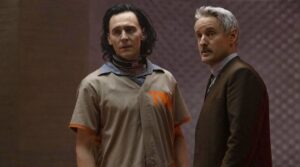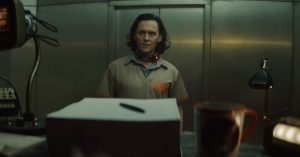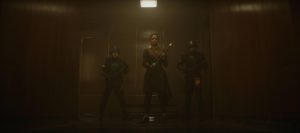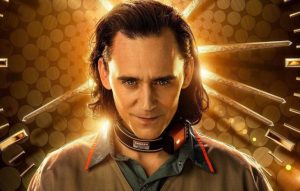SPOILERS FOR LOKI AHEAD!
The greatest compliment I can give Loki is that in just its first episode, it already feels like a long-lost sequel or companion piece to the Dirk Gently’s Holistic Detective Agency books, complete with recurring characters from Norse mythology. Just swap out the hilarious, bumbling, kind-hearted Gently for Owen Wilson’s hilarious, bumbling, seemingly-kind-hearted-but-probably-a-lot-more-formidable-than-he-lets-on Mobius M. Mobius, and the holistic detective agency itself for the vast, sprawling entity of the Time Variance Authority, a nigh-on omnipotent organization on the outskirts of the Marvel Cinematic Universe, whence Mobius and a fleet of agents nicknamed Minutemen preside over what they call “The Sacred Timeline”.

Throw in a time-hopping mass murderer (or rather, two versions of the same being), and you’ve got yourself an absurd yet surprisingly profound semi-satirical comedy of which I think Dirk Gently’s creator Douglas Adams, or for that matter Good Omens‘ Neil Gaiman or Discworld’s Terry Pratchett, would be proud. What these three authors have in common (or at least, the one shared trait I’m interested in for the purposes of this review) is their Englishness. Loki‘s head writer Michael Waldron is not himself English, which I personally find fascinating, because he’s nevertheless created something distinctly in the same vein as both the aforementioned authors’ works and the long-running English TV show Dr. Who, using the same kind of humor, dry wit, and quirky stylistic choices as those other – fantastic – pieces of media.
Some of that must surely be attributable to Waldron’s partners in inter-dimensional crime behind the scenes and in front of the camera, both of whom actually are English: director Kate Herron, who brings sophistication and humor in equal parts to her work; and Tom Hiddleston, who returns to the title role with the same vigor and Shakespearean gravitas he’s been breathing into the character of Loki Laufeyson since the very first Thor movie. Hiddleston’s still got it: the “it” in this case being the ability to turn on a dime from raging homicidal god-king “burdened with glorious purpose” to pleasantly rakish charmer, and to win our hearts either way. The fact that Loki himself doesn’t distinguish between the two sides of his personality just makes it all the more enjoyable, because he’s a god, unconcerned with being one thing or another when he can be everything at once and never have to answer to anyone, for anything.
Well, at least until the Time Variance Authority (TVA, for short) interrupts his attempted escape from the alternate timeline which diverged from 2012 during Avengers: Endgame. The beauty of this is that Loki represents, or believes he represents, extreme anarchy: chaos for chaos’ sake, nihilism across all Nine Realms, and the threat of Ragnarok hurled at whoever would oppose his misrule. The TVA is the antithesis of everything he stands for – it is the very pinnacle of rigid mechanical capitalism and all the lifeless bureaucracy that comes with it, grinding inexorably forward yet going nowhere, rewarding conformity and seeking to violently eliminate any deviation from the status quo which cannot be manipulated to serve the institution.
That’s the capitalism embodied by Mobius M. Mobius, who steps in to protect Loki from the harsh sentence passed down by the TVA’s Judge Renslayer (Gugu Mbatha-Raw). He frames his intervention as an act of mercy, but what he sees in Loki is an opportunity to help the TVA continue as it always has. In the premiere episode’s final minutes, it’s revealed that at least one other variant of Loki exists, and that the TVA has been struggling to capture and contain this variant before his (or more likely, her) reckless gallivanting across the timeline causes a second multiversal war like the one depicted in a retro animated flashback playing on the TV in one of the TVA’s waiting rooms. This threat to the capitalist system is posed by an anarchist, albeit one who seems more wholeheartedly committed to bringing about the end of all order than our self-doubting Loki – but Loki is nonetheless the sole individual who could conceivably get into this variant’s headspace, figure out their next move, and help bring them into custody.
He’s a tool, basically.

But Mobius, while exploitative and callous, is the best option Loki’s got at the moment. Renslayer, who appears to the be the most devoted to the overarching mission of the TVA, clearly wants him eliminated (and once he’s done using the God of Mischief to his advantage, I’m positive Mobius will back her in that effort), while Hunter B-15 (Wunmi Mosaku), a trigger-happy field agent whose disgust for Loki seems to outweigh her loyalties to the organization, seems like she might laser-beam him out of existence the second Mobius’ back is turned. It’s understandable why they’re all wary: Loki is a corrosive force of nature, who could easily disrupt the TVA’s workflow with his unpredictable attitude. It starts with telling Casey the receptionist (Eugene Cordero) what a fish is, but where does it end? Mutiny against the TVA elite?
The TVA is supposedly presided over by a trifecta of alien deities known as the Time-Keepers, who, according to the aforementioned animated propaganda, were responsible for saving the multiverse from self-destruction in the far-distant past (or perhaps its future; time is weird that way). But they appear to have taken a step back from the organization in the millennia since, assuming they’re even still alive, or existed in the first place. Now, the closest thing the TVA has to a leader is their animated mascot Miss Minutes (voiced by Tara Strong), a grinning clock-face with a Southern drawl who ruminates cheerfully from a thousand screens and posters in every TVA office, waiting room, and hallway, on all the possible ways to terminate time variants who step out of line.
In the absence of much action, the premiere is free to do a lot of world-building (and I mean a lot, more than was probably necessary for most general viewers), heightening our sense of awe and fear with an almost surgically precise use of Natalie Holt’s dizzying psychedelic score, which vibrates in the TVA’s laminated floors and builds to a crescendo as Loki gets his first glimpse of the organization in its entirety: a trippy sci-fi wonderland of infinite spires, columns, and cathedral-like structures, all decorated in violent shades of taupe. It’s a place where the earth-shattering events of the MCU have no relevance, where spare variant Infinity Stones get tossed around as paperweights – a humbling revelation that just goes to show how much pain could have been averted at literally any point in the MCU’s history if the TVA actually cared about the people in the Sacred Timeline they’re meant to protect.
But they don’t. Their belief is that the Sacred Timeline will take care of itself, if they stick to pruning the offshoots, the alternates, and the variants. What constitutes a deviation from the timeline is still rather unclear – for instance, it’s revealed that the TVA was perfectly okay with Loki hijacking a plane in the 1970’s after losing a bet to his brother Thor, and becoming internationally famous on Earth as the mysterious D.B. Cooper. Is it the Time-Keepers making these decisions on what can be allowed to happen? Is it Miss Minutes? Who is behind all this?

I suspect we’ll find out more soon enough, and the answer may have something to do with the Loki variant whose been wreaking havoc in 16th Century France and 1850’s Oklahoma (1858 in Salina, Oklahoma, specifically: an extremely deep-cut reference, one year before the first oil was discovered in the state). I have little doubt that said variant will turn out to be some version of Lady Loki, played by Sophia Di Martino, although other candidates range from Richard E. Grant as Old Loki to Jonathan Majors as Kang the Conqueror. This rollercoaster is just getting off the ground, and I can tell we’re in for a wild ride.
Episode Rating: 9/10






